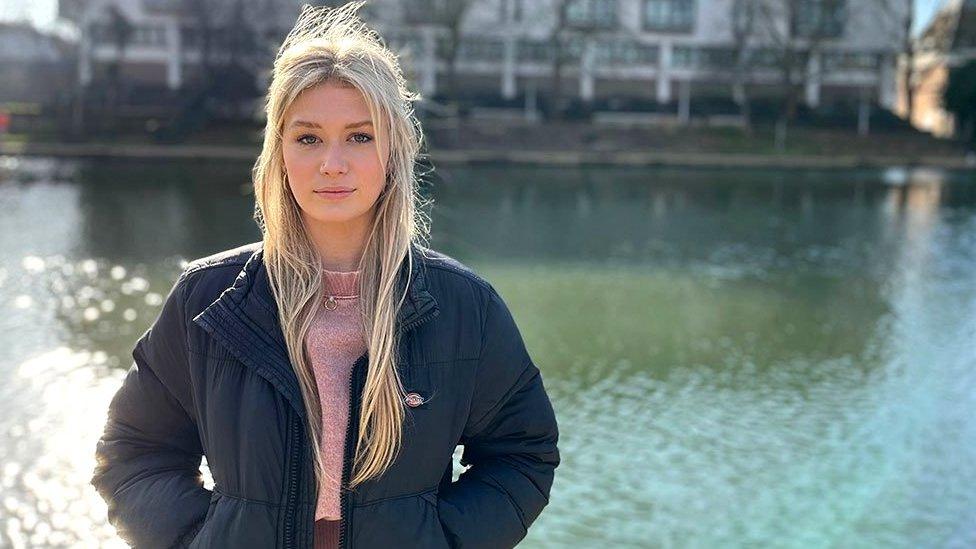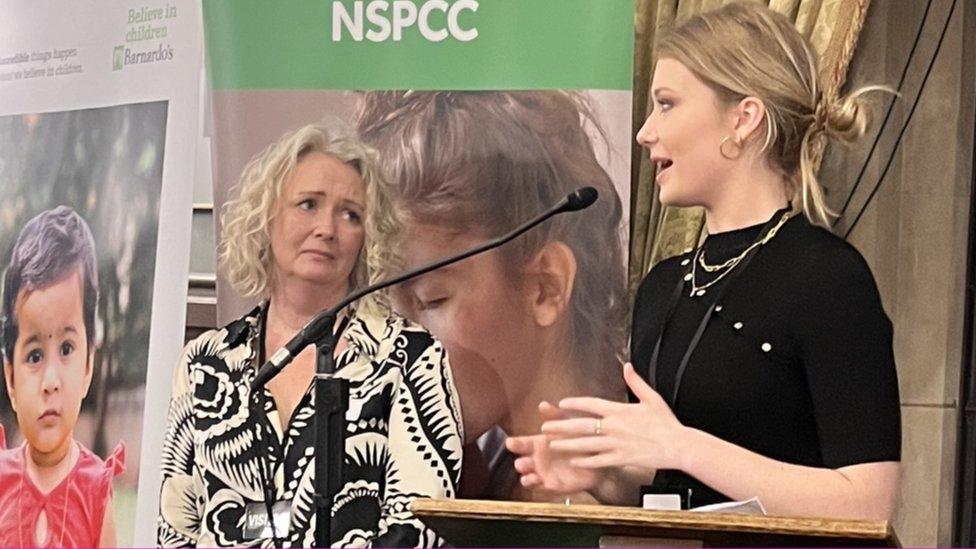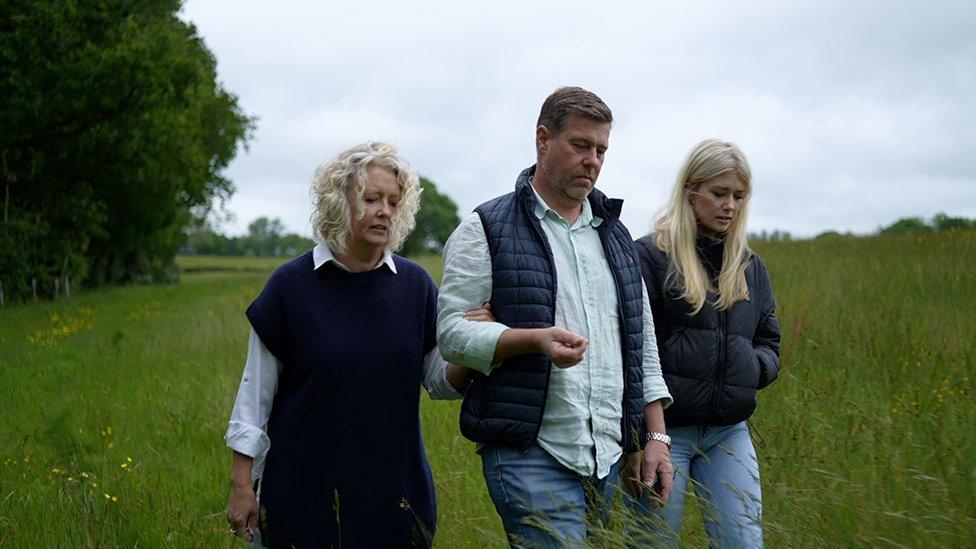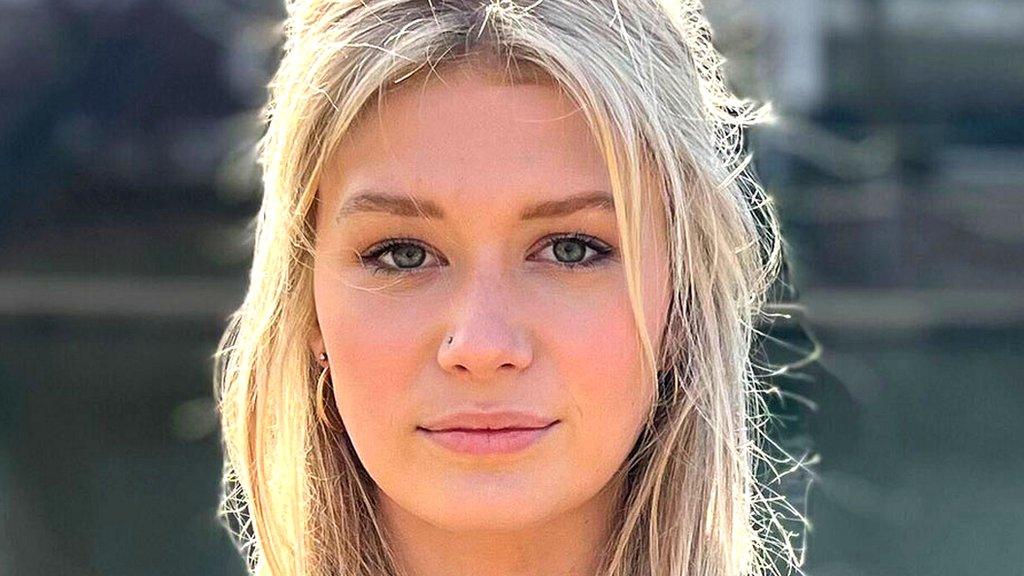Child sexual abuse victims waiting longer for help, report finds
- Published

Poppy, 18, waited five months for counselling support
Tens of thousands of child sexual abuse victims face long waits for vital support, a major report has found.
It takes at least six months for many to get help including therapy, advice and counselling, but some wait over a year, the Centre of expertise on child sexual abuse (CSA Centre) report says.
Coverage is patchy, with victims facing a "postcode lottery" in accessing support, according to researchers.
Service providers say they cannot keep up with rising demand.
Some of them are forced to limit available support.
The government says it is increasing funding for support services and wants every victim to be able to access support quickly but acknowledges there is more to do.
This is the first wide-ranging study of services offering free support to victims of child sexual abuse and their families.
The CSA Centre is funded by the Home Office and backed by children's charities, and its report identifies 468 services offering free support to victims of child sexual abuse and their families in England and Wales.
It says waiting times have more than doubled since 2015.
Most of the services are small and run by not-for-profit organisations. Nearly half see fewer than 100 people a year.
A majority are not fully confident they can maintain their current service levels next year and are uncertain about their long-term funding.
Yet the CSA Centre estimates at least 500,000 children will experience some form of sexual abuse each year, including exploitation and online abuse.
Many may not tell anyone until they are adults. Others never feel able to report what happened.

Poppy and Miranda speak to Peers in Parliament on Tuesday
Poppy, 18, was sexually abused by her paternal grandfather when she was a toddler. She waived her right to anonymity to speak to the BBC last year.
This week, she was at the Houses of Parliament lobbying for changes to the Victims and Prisoners Bill, external currently being debated, to ensure it fully recognises the rights and needs of children.
Poppy was 11 when she finally managed to tell her parents what happened to her.
She was so anxious, it was making her ill. Worried about distressing her parents, she was desperate to talk to someone outside the family, but she had to wait five months for counselling.
"I probably wouldn't be here [without counselling]," she says. "Now, when I have a bad day, I don't completely crash."
Speaking to a counsellor each week gave her the tools to deal with complex feelings of guilt and distress.

Poppy's parents Miranda and David were also able to access support
Counselling was also vital for her mother, Miranda, and father, David, enabling them to support Poppy and each other.
"It was invaluable," Miranda says. She remembers the "lightbulb moment" when Poppy understood what had happened was "not her fault".
"From that moment, we had a different child," she says.
In 2018, Poppy's grandfather was jailed for 13-and-a-half years for abusing her. He died in prison.
Poppy felt she had to wait a long time before she was able to see someone. She now believes she was fortunate not to have waited longer.
"Our society is allowing abuse victims to be on their last legs before they get help," she says.

A teenager's story of survival and making a difference. By talking openly about the sexual abuse that devastated her early life, Poppy is determined to challenge the taboos that make it difficult for survivors to ask for and get help.

The study shows the support available varies hugely depending on where you live.
In Wales, the CSA Centre estimates there are 10,000 victims for every support service available and in the West Midlands, 20,000.
The Rape and Sexual Violence Project (RSVP) operates in Birmingham and Solihull. It provides services including counselling and advocacy for children and adults who have experienced sexual abuse as a child.
"Sometimes our services are absolute lifesavers," RSVP chief executive Lisa Thompson tells the BBC. "They're the words that some survivors use."
Need and demand have increased. Three in five of the adults and children it supports have been subjected to childhood sexual abuse.
Children can access advocacy and wellbeing services immediately, but 120 to 150 are typically waiting between four and five months for counselling at any one time.
"Waiting is problematic and really distressing in and of itself," Ms Thompson says.
"That can lead to severe distress which could lead to self-harm or suicide attempts."
She calculates RSVP would need to offer children 200 appointments a week to achieve much quicker responses - double what it can now.
A total of 106,984 child sexual abuse offences were reported in 2022, a 7.6% increase on 2021, police figures indicate.
More than half involved reports of children (aged 10 to 17) offending against other children.
The CSA Centre says greater awareness is one of the reasons why more cases are being reported.
But its director, Ian Dean, says the research shows a huge and growing gap between the numbers needing support and services available.
"We estimate that one in 10 children will experience some form of sexual abuse before the age of 16.
"It's simply not acceptable that some survivors are having to wait years to access support," he says.
'Left alone'
Lynn Perry, chief executive of children's charity Barnardo's, says the findings are depressing but not surprising.
"Thousands of children across the country are being left alone to cope with abuse or exploitation," she says.
A government official said it wanted all victims of child sex abuse to have "swift access to the best possible support" and knew "more needs to be done".
In the next financial year, funding for support services would be quadruple the £41m allocated in 2009-10, while "the number of independent sexual-violence advisors - including those working with children" would rise to "more than 1,000 in the next 12 months", the official added.
Despite the pressures the sector is facing, charities are clear those affected by child sexual abuse should come forward and seek help.
If you are affected by any of the issues in this article you can find details of organisations that can help via the BBC Action line.

Sign up for our morning newsletter and get BBC News in your inbox.

Related topics
- Published28 July 2023
